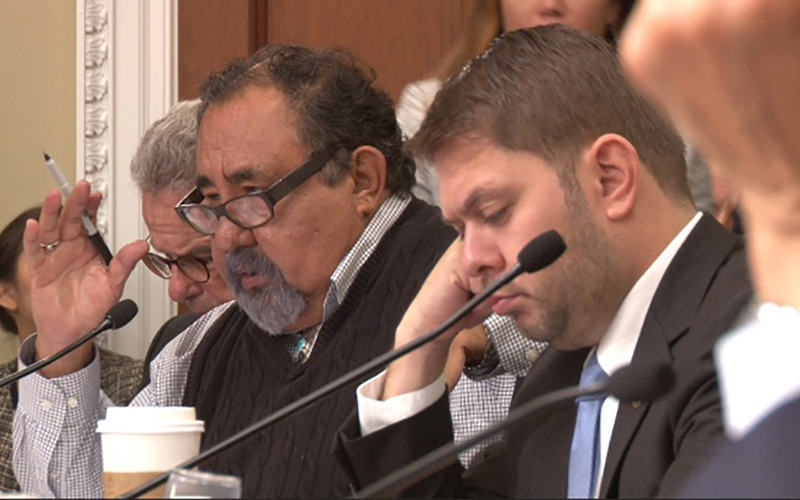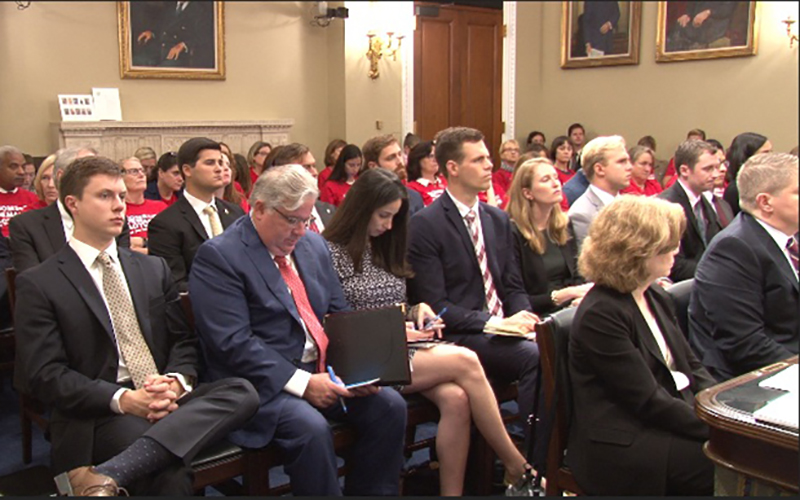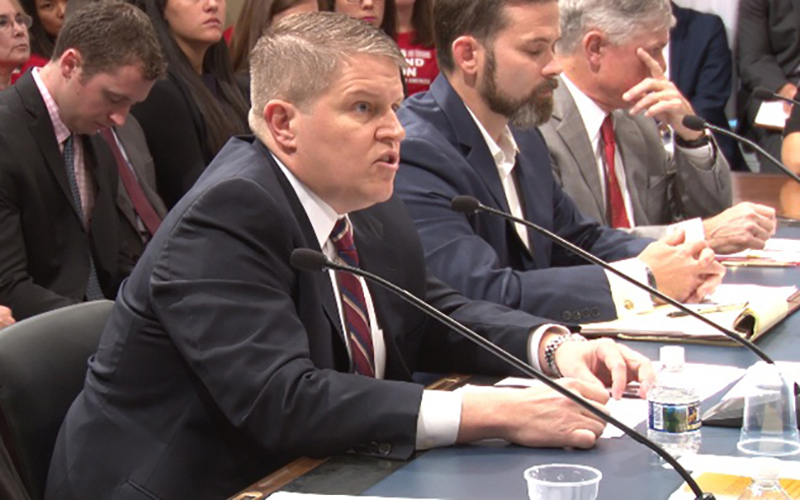
Democratic Reps. Raul Grijalva, left, of Tucson and Ruben Gallego of Phoenix were highly critical of a hunters’ rights bill that they called little more than a thinly veiled vehicle to ease restrictions on silencers and armor-piercing bullets. (Photo by Trevor Fay/Cronkite News)

A packed House Natural Resources Committee hearing on the SHARE Act Tuesday included a number of members of the group Moms Demand Action for Gun Sense in America, who were sporting red T-shirts for the hearing. (Photo by Trevor Fay/Cronkite News)

David Chipman, a senior policy adviser for Americans for Responsible Solutions, said the SHARE Act would provide a loophole allowing people to buy gun silencers without having to go through the current background check. (Photo by Trevor Fay/Cronkite News)
WASHINGTON – Gun-control advocates blasted a hunters’ rights bill in a House hearing Tuesday, calling it little more than a “cowardly” attempt to ease restrictions on silencers and armor-piercing bullets being pushed by the gun lobby.
The Sportsmen’s Heritage and Recreational Enhancement, or SHARE, Act includes 18 proposals to ease restrictions on hunting on federal lands, increase access to shooting ranges and make it easier to transport guns and bows across state lines, among other measures.
But the silencer and armor-piercing bullet proposals “corrupt … what should have been a good piece of legislation,” said Rep. Raul Grijalva, D-Tucson, at House Natural Resources Committee hearing on the bill Tuesday.
“The hunters I know don’t use armor-piercing bullets and they don’t use silencers,” Grijalva said.
Supporters of the bill disagreed, saying there are legitimate reasons to use silencers when hunting, which can keep from disturbing others who may be nearby and can protect a hunter’s hearing.
“You shouldn’t have to injure your hearing to exercise your constitutional right,” said Christopher Sharon, CEO of Hope for Warriors, in testimony Tuesday. He said those trying to protect their hearing would benefit from the use of silencers and that earplugs “aren’t that good.”
Sharon, whose organization serves veterans, said the bill would “simply make it easier for law-abiding people to protect their hearing.”
“Preserving what remains of our heroes’ hearing, while still giving them the opportunities to live a full life is our goal,” he said. “The use of silencers is a tool for many who seek to continue to hunt or reconnect with nature.”
The bill includes sections making it easier for “good Samaritan” groups to help with search-and-rescue missions on federal lands, extending the North American Wetlands Conservation Act and allowing the use of lead shot and lead fishing tackle under some circumstances.
Tucked between a provision that would take the gray wolf in the Great Lakes region off the endangered species list and another that would extend the Federal Land Transaction Facilitation Act are the sections that drew most of the attention Tuesday, or silencers and ammunition.
David Chipman, a senior policy adviser for Americans for Responsible Solutions, said the silencer proposal was originally its own bill, the Hearing Protection Act, but the language was rolled into this bill because it would not have passed on its own.
He called it “troubling … when you take a piece of legislation like the Hearing Protection Act that can’t get traction in other bodies that deal with criminal justice issues and you try to slip it into another bill and you hope that no one shows up and no one sees that it’s coming.”
“American politics works best when it’s transparent; everyone can see what’s going on and we can have an honest and open debate,” Chipman said.
If passed, he said, the SHARE Act would provide a loophole for people to purchase silencers over the internet without a background check. Without those background checks, Chipman said, law enforcement would lose a valuable tool they now use to prevent crime before it happens.
But Stephen Halbrook, an attorney who has argued several gun-rights cases, testified that the bill is needed to rein in the “rather limitless power” of the attorney general to bar ammunition from importation by classifying it as armor-piercing.
And Anna Seidman, director of government affairs and litigation at Safari Club International, said that silencers – or “mufflers” – when used with ear plugs offer additional hearing protection and cause less of a disturbance to those around a hunter.
“If you are out in the field and you are hunting and you shoot without a muffler, you could interfere with the shooting opportunities or hunting opportunities of other people who are out there,” Seidman said. “In addition, when there are people who are enjoying the area for non-hunting purposes, the muffler makes less noise.”
But Chipman cited accounts of people who were shot at during a congressional baseball practice in June, who said they were able to react quickly and avoid further injury because they recognized the sound of gunfire. Chipman said the only benefits silencers offer is distorting the sound of gunfire while not significantly lessening the sound generated.
The reference to the baseball field shooting that wounded Rep. Steve Scalise, R-Louisiana, and three others, angered Rep. Liz Cheney, R-Wyoming. She accused Chipman of using the incident as a “tool” to impose more gun-control measures.
Cheney argued that it was not the sound of gunfire that saved the group, but the gunfire returned by police officers that killed the shooter.
But Grijalva said the real reason for those additions to the bill was to further the interests of the gun lobby and boost sales for these weapon accessories by marketing them to an urban consumer base as hearing protection.
“This hearing should have been about how we can, in our public lands, provide a balanced access for sportsmen,” he said. “There’s so much at stake here to allow these pieces of legislation to corrupt and influence what should have been a good piece of legislation.”